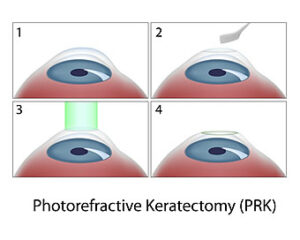Is Cataract Surgery Possible if You’ve Already Had PRK?
Are you someone who had PRK that now needs cataract surgery? Many patients who have laser vision correction procedures like LASIK and PRK may think that they can’t have cataract surgery in the future.
But this is a common misconception that isn’t true. Your cataract surgeon should be able to remove your cataracts even after you’ve had PRK.
Keep reading to learn more about both procedures and why cataract surgery is safe if you’ve had PRK in the past.
What is PRK?

PRK is a laser vision correction procedure that treats refractive errors. These include nearsightedness, farsightedness, and astigmatism.
Many patients find that they qualify for PRK if they have thin corneas, larger pupils, or high refractive errors. These are some factors that may affect LASIK candidacy.
PRK and LASIK are very similar except for one significant difference. LASIK involves creating a flap in the cornea to access the inner layer. Access to the cornea’s inner layer allows your surgeon to reshape it and correct refractive errors. But during PRK, there is no flap created.
Instead, your surgeon removes the epithelium, the cornea’s outer layer. After removing the outer layer, the surgeon uses a laser to reshape the cornea and correct refractive errors.
As there is no flap, the epithelium is then left to regenerate. If you play contact sports like boxing, soccer, or wrestling, or participate in other high-impact activities, PRK is sometimes considered a safer option than LASIK.
Because there is no flap created during PRK, there’s no risk of it getting dislodged due to injury. Flap dislodgement may lead to serious complications or vision problems.
PRK is a highly successful laser vision correction procedure that has changed millions of people’s lives. Like LASIK, most patients end up with 20/20 vision or better. Although it has a longer recovery time, patients may still have improved vision and desired results.
After PRK, you can look forward to many years of improved vision from glasses and contact lenses. But because PRK only treats current refractive errors, it can’t prevent you from developing age-related conditions like cataracts.
What is a Cataract?
Cataracts occur when the natural lens in your eye becomes cloudy. When this happens, it makes it harder to see clearly and complete everyday tasks.
Cataracts form when proteins in your eye break down and form clumps on the lens. Although cataracts can develop for several reasons, the most common is due to aging. Your risk of developing cataracts may increase due to the following factors:
- You’ve suffered a serious eye injury
- You have diabetes
- You’re a smoker
- You’ve undergone radiation therapy
- You’ve had too much exposure to the sun’s UV rays
- Prolonged use of certain medications like corticosteroids

Cataracts cause the following symptoms that worsen with time, including:
- Blurry or foggy vision
- Increased sensitivity to light
- Halos and glare
- Frequent prescription changes to your glasses and contact lenses
- Poor night vision
- Colors appearing faded, muddy, or brown
- Double vision in one eye
- Needing brighter light for activities like reading
Eventually, cataracts reach a point where they make it hard or even impossible to perform everyday activities like reading, watching TV, or driving. Although you may have cataracts, it doesn’t mean you must have cataract surgery immediately.
Most cataract surgeons recommend removing your cataracts when you can no longer take part in everyday tasks. Cataract surgery is the only way to restore your ability to see clearly and regain your independence.
The procedure is highly effective and low-risk. As the most performed medical procedure in the country, almost everyone will have to undergo it due to the natural aging process.
Why Cataract Surgery is Possible if You’ve Had PRK
Although it seems like undergoing a laser vision correction procedure like PRK would make cataract surgery more challenging, it shouldn’t stop you from having it. Cataract surgery and PRK treat different parts of your eye and separate visual issues.
PRK involves reshaping the cornea to focus light correctly onto the retina. Refocusing light helps correct refractive errors.
During cataract surgery, the retina and cornea are not treated. Instead, your cataract surgeon removes your natural lens and replaces it with an intraocular lens (IOL).
The IOL restores your ability to see clearly and takes over the job of the now cloudy and distorted lens.
Special Considerations if You’re Having Cataract Surgery After PRK
Before removing your cataracts, an essential part of the procedure is choosing an intraocular lens. You’ll make this decision based on recommendations from your eye doctor.
What kind of IOL you choose will depend on your visual needs and goals after cataract surgery. If you’ve had PRK, you’ll need to go through a few extra but crucial steps.
For the best and most precise results after cataract surgery, it is best to obtain your prescription as it was before having PRK. Most eyecare practices will keep this information on file after your procedure.
You should be able to request this and then forward it to your cataract surgeon. Having this extra but necessary information will help you choose the most suitable IOL.
It will also help ensure you have the most precise cataract surgery possible.
Choose a Top-Rated Cataract Surgeon

At Desert Vision Center, Dr. Tokuhara uses sophisticated approaches to ensure having cataract surgery after PRK produces exceptional results. If cataracts have considerably affected your vision, it may be time to have them removed.
Stop living with the frustrations of cataracts! Schedule your cataract screening at Desert Vision Center in Rancho Mirage, CA! Isn’t it time to see clearly once more?

